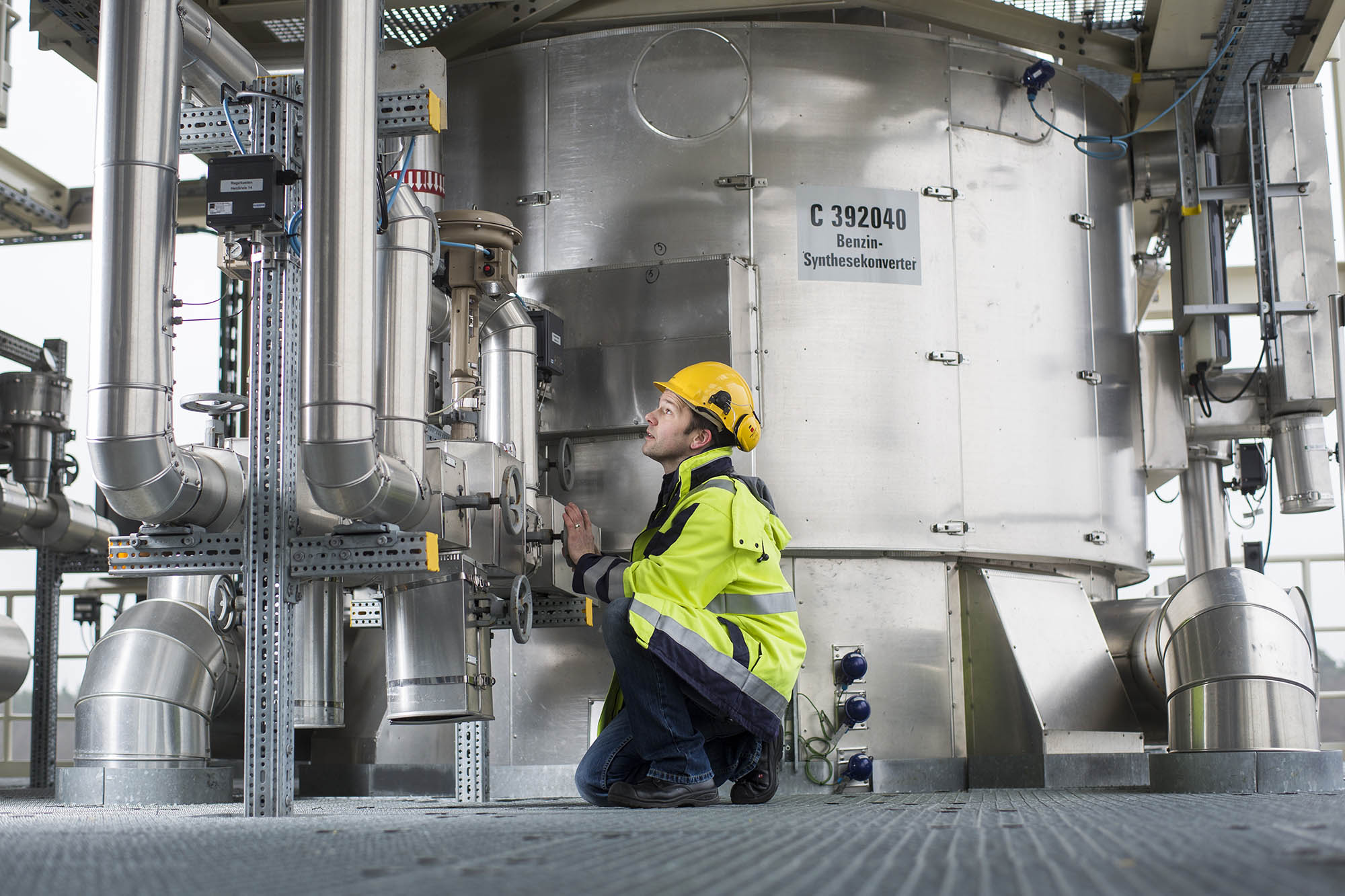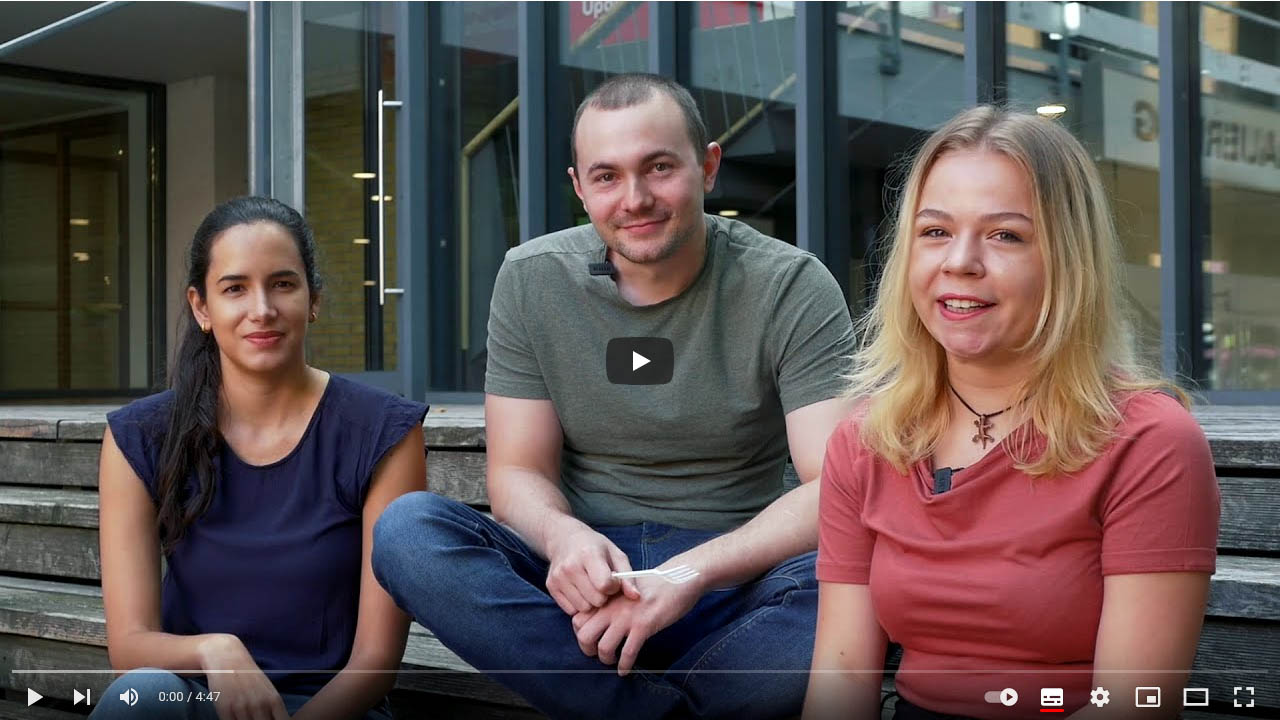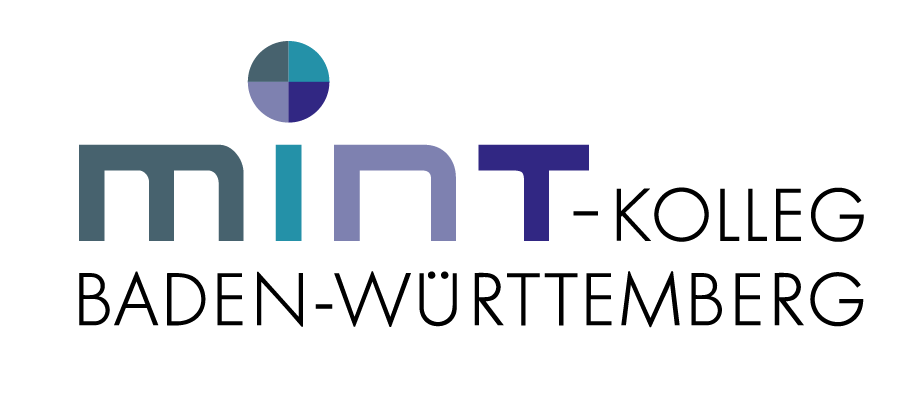Degree: Bachelor of Science (B.Sc.)
Regular program length: 6 semester (full-time program)
Credit points (ECTS): 180 credit points
Language of instruction: German
Higher semester: no
Higher semester: winter and summer term
First semester: September 15
Higher semester: September 15 for winter term, March 15 for summer term
First semester: July 15
Higher semester: July 15 for winter term, January 15 for summer term
Studiengangsbeschreibung
Worum geht’s?
Im Studiengang Chemieingenieurwesen lernst du, chemische Prozesse zur Herstellung von Produkten zu analysieren, zu konzipieren und auch zu verbessern. Dazu benötigst du Wissen über chemische und physikalische Prinzipien, das du dann in Konzeption und Konstruktion von Anlagen und Maschinen und im Design von Produktionsprozessen anwenden kannst. Technisches und naturwissenschaftliches Interesse solltest du also auf jeden Fall mitbringen. Vorlesungen, aber auch praktische Übungen im Labor und an Anlagen stehen auf deinem Studienplan.
Chemieingenieurinnen und -ingenieure wandeln natürliche Rohstoffe in Produkte um, die du aus dem Alltag kennst: Verpackungen, Kunststoffe, Nahrungsergänzungsmittel oder Kosmetika. Nachhaltigkeit, Energieeffizienz und Recycling sind große Forschungsthemen. Wenn du einen abwechslungsreichen und anwendungsorientierten technischen Studiengang suchst, der dir am KIT durch viele Wahlmöglichkeiten in der zweiten Hälfte deines Bachelorstudiums eine individuelle Profilbildung ermöglicht, bist du im Chemieingenieurwesen richtig.
Program structure
During your studies, you have various subjects, which consist of one or more modules. A module deals with a specific topic and consists of one or more courses. In the module handbook for your degree program, you will find a description of the modules and their subject assignment as well as a study plan. This gives you an orientation as to which courses you should attend in which semester in order to complete your studies within the standard period of study. It takes into account a balanced distribution of courses over the individual semesters. It also ensures that you are first taught the important basics before moving on to more advanced topics. Your individual course of study may differ from this.
Im Studiengang Chemieingenieurwesen besteht dein Studienplan zunächst aus diesen Fächern:
- Mathematisch - Naturwissenschaftliche Grundlagen: Mathematische, chemische und physikalische Grundlagen sowie Programmieren stehen in den ersten Semestern auf deinem Studienplan.
- Ingenieurwissenschaftliche Grundlagen: Neben Mechanik, Dynamik und Statik beschäftigst du dich mit Werkstoffen und Regelungstechnik sowie der Maschinenkonstruktionslehre.
- Thermodynamik und Transportprozesse: Du lernst, Energiewandlung, Strömungen und thermodynamische Prozesse zu beschreiben und zu berechnen und die Grundlagen der Wärme- und Stoffübertragung kennen.
- Verfahrenstechnische Grundlagen: Du belegst die drei Module mechanische, thermische und chemische Verfahrenstechnik.
Neben diesen fest vorgegebenen Fächern hast du insbesondere in den höheren Semestern einige Wahlmöglichkeiten in den Fächern:
- Wahlpflichtfächer: Du wählst zwei Module aus über zehn Optionen, beispielsweise Energieverfahrenstechnik, Maschinenkonstruktionslehre oder die Einführung in das Bioingenieurwesen.
- Profilfach: Du wählst ein Profilfach, das sich über zwei Semester erstreckt und jeweils eine praktische Komponente beinhaltet – zum Beispiel Luftreinhaltung oder Lebensmitteltechnologie.
- Überfachliche Qualifikationen: Verpflichtend belegst du eines der Module Ethik und Stoffkreisläufe oder Industriebetriebswirtschaftslehre. Wahlweise kannst du beide Module absolvieren oder beispielsweise einen Sprachkurs beziehungsweise ein Angebot des House of Competence anstatt dessen als Schlüsselqualifikation einbringen.
Stays abroad
KIT offers a wide range of options for stays abroad, from individual courses to a year abroad. Especially if you are interested in a longer stay abroad, it is advisable to contact the International Students Office early on.
Bachelorarbeit
Am Ende deines Bachelorstudiums fertigst du deine Bachelorarbeit an, eine wissenschaftliche Arbeit, die es dir ermöglicht, dein erlangtes Wissen und deine Fähigkeiten anzuwenden und zu vertiefen. Normalerweise behandelt sie ein spezifisches Thema in deinem Studienfach und erfordert eigenständige Forschung, Analyse und das Verfassen einer schriftlichen Ausarbeitung. Die Bearbeitungsdauer der Bachelorarbeit beträgt vier Monate.
Weitere Informationen
Außer dem Modulhandbuch ist unsere Studiengangbroschüre eine nützliche Informationsquelle. Sie behandelt auch Themen wie Bewerbungsverfahren, Studieneinstieg und Berufsperspektiven.
Qualification profile of the graduate
The Bachelor's program provides knowledge on scientific fundamentals and methodical expertise in the area of Chemical and Process Engineering. The Bachelor's degree qualifies students to enroll for a Master's program. Furthermore, it enables students to apply the acquired theoretical knowledge to a concrete professional field.
The compulsory program in the first and second year focuses on methodical and qualified fundamental knowledge of mathematics, natural sciences and engineering. This includes in particular the knowledge of heat and mass transfer and the most important unit operations in the field of thermal, chemical and mechanical process engineering. Graduates will be able to balance engineering processes appropriately.
The knowledge acquired in the first and second year is not only the basis for the third year of the Bachelor's program, but also for the following Master's studies. Mandatory elective courses in the third year of study offer the opportunity to gain in-depth knowledge in a specialist area for the first time. As part of the specialization, students will apply basic process engineering knowledge in a project work. In addition to technical aspects, working on a project in a team as well as preparing, interpreting and presenting the results are important parts of the specialization subject.
Within their Bachelor's thesis, students prove the ability to work on specialized problems in the field of chemical and process engineering independently and within a defined time frame using scientific methods.
Graduates are qualified to identify, abstract, and solve technical problems using the basic knowledge provided during the Bachelor's program. Furthermore, they can evaluate products and processes systematically as well as select and apply analyzing and simulation tools. They are able to combine theory and practice as well as to organize and implement projects independently. Graduates are able to collaborate with experts in other fields.
Berufsperspektiven
Nach dem Bachelorabschluss hast du die Möglichkeit, im Masterstudium dein Wissen zu vertiefen. Wenn es dich in den Beruf zieht, öffnen sich dir viele Arbeitsfelder. Hierbei sind vor allem die Energie-, Lebensmittel-, Pharma- und Kosmetikbranche zu nennen, aber auch Fahrzeugtechnik und Anlagenbau, sowie Abfallbehandlung, Nachwachsende Rohstoffe, Medizin-, Umwelt- und Versorgungstechnik. Du wirst Verfahren optimieren im Sinne der Nachhaltigkeit, Sicherheit und Produktqualität, technische Apparate konstruieren oder neuartige Produkte entwickeln. Auch in der Qualitätskontrolle oder im Vertrieb kannst du deine Kenntnisse einsetzen. Für Führungsaufgaben und Tätigkeiten in Forschung und Entwicklung wird in der Regel der Masterabschluss verlangt. In Produktion, Konstruktion und Vertrieb werden auch Bachelors gerne eingesetzt.
Besonderheiten des Studiengangs
Besonderheiten von Chemieingenieurwesen und Verfahrenstechnik B.Sc. am KIT
- Eigene Fakultät mit großem Studienangebot
- Forschungsorientierte Lehre
- 10 Profilfächer wählbar
- Erleichterter Studieneinstieg durch „smartMentoring“
- Vorbereitungs- und Unterstützungskurse am MINT-Kolleg
What KIT has to offer
- central campus close to the city forest and right next to the city center
- orientation week before the start of lectures
- 24-hour library offering single and group working places
- wide range of inexpensive catering options (dining hall, cafeteria, Koeri and Pizzawerk)
- numerous interdisciplinary offers for personal and professional development, e.g. Lernlabor, Schreiblabor and Perspektivenlabor
- study abroad, e.g. via Erasmus
- excellent university sports facilities with a large selection of sports
- comprehensive cultural offerings with university orchestras, choirs and theater groups
- extensive support for career entry and self-employment
- Lernraum app
- internationally oriented degree programs and diverse exchange programs
- modern laboratories and practical teaching methods
- diverse student initiatives, clubs and opportunities to actively participate in campus life
- stay in touch after graduation via the alumni network
Zugangsvoraussetzungen und Sprachnachweise
Higher education entrance qualification (HZB)
Germans and persons of equal status to Germans (i.e. EU/EEA nationals and non-EU/EEA nationals with a German higher education entrance qualification) are entitled to study at KIT if they have one of the following qualifications:
- General higher education entrance qualification (Abitur)
- (relevant) subject-restricted higher education entrance qualification (not Fachhochschulreife)
- Delta examination of the University of Mannheim (for holders of a Fachhochschulreife)
- recognized advanced vocational training (e.g. master craftsperson) or vocational training, professional experience and aptitude test for those with professional qualifications
For further options, see §58 of the "Landeshochschulgesetz" (State Higher Education Act).
Please note: German nationals with a foreign school-leaving qualification must have the relevant "Regierungspräsidium" (regional authority) certify that their qualification is equivalent to the German Abitur.
For non-EU/EEA nationals with a foreign school-leaving certificate (hereinafter also referred to simply as non-EU/EEA nationals), the school-leaving certificate from some countries is recognized as a direct university entrance qualification in Germany. In many cases, however, in addition to the school-leaving certificate, a university entrance examination and/or a successful year of study in the home country and/or the "Feststellungsprüfung" must be proven with valid documents in order to be allowed to study a bachelor's degree in Germany. You can find the country-specific regulations in the DAAD admissions database or on the Anabin website (in German only) of the "Zentralstelle für ausländisches Bildungswesen" (Central Office for Foreign Education). Further information is available from the International Students Office.
Sprachvoraussetzungen und -nachweise
Für den Bachelorstudiengang Chemieingenieurwesen und Verfahrenstechnik benötigst du ausreichende Kenntnisse der deutschen Sprache, welche mindestens dem Niveau C1 des Gemeinsamen Europäischen Referenzrahmens für Sprachen (GER) entsprechen.
Proof of sufficient German language skills
Your higher education entrance qualification (HZB) is sufficient proof of your German language skills,
-
if you obtained it at a German-speaking school in Germany or abroad,
-
if you are a graduate of a bilingual secondary school in Germany or abroad and have passed a bilingual German examination, such as the AbiBac or the Gemischtsprachiges International Baccalaureat (GIB) or
-
if you graduated from a foreign school, but there is another official agreement with the respective country on the recognition of your school-leaving certificate or language certificate as proof of language proficiency for university studies in Germany.
A complete list of foreign school-leaving qualifications and language certificates that are recognized as proof of sufficient German language skills can be found on the website of the Kultusministerkonferenz (Standing Conference of the Ministers of Education and Cultural Affairs of the Länder in the Federal Republic of Germany).
If you did not obtain your higher education entrance qualification at a German-speaking institution, you must provide a separate language certificate - regardless of your nationality. Only the following are accepted
- the passed „Prüfungsteil Deutsch“ of the Feststellungsprüfung,
- the passed DSH with the overall result DSH-2,
- the passed TestDaF level 4 in all four parts of the exam (reading comprehension, listening comprehension, written expression, oral expression) or
- a comparable, recognized certificate of sufficient German language skills.
To find out which other recognized certificates can be accepted as comparable by KIT, please contact
- as a German or German-equivalent applicant: Studierendenservice
- as an applicant with non-EU citizenship: International Students Office
Please note:
Language certificates are extremely important application documents that can prevent your enrollment if you do not submit them on time. Therefore, check early on in the application process whether you have the necessary language certificates for your degree program and, if necessary, plan to take one of the language tests mentioned above. The deadline by which you must submit language certificates corresponds to the enrollment deadline stated in your admission offer. In justified cases, you can apply for an extension of this deadline. The extension can be granted until the start of the lecture period at the latest.
Additional necessary requirements for enrollment
For Germans and those with German equivalent status, an additional necessary requirement for enrollment is proof of participation in a study orientation test (e.g. www.was-studiere-ich.de) or a study orientation consultation in accordance with §7 of the "Landeshochschulgesetz" (State Higher Education Act), e.g. by the Student Advisory Service (ZSB) of KIT. Non-EU/EEA nationals do not have to provide this proof.
Application portal
Application for the 1st semester
Application for a higher semester
Study preparation
Prepatory courses at KIT: The MINT-Kolleg offers prospective and first-year students support in natural science and technical subjects (STEM).
In addition, the KIT-Departments offer special preliminary courses before the start of the semester program during the "O-Phase" (orientation week).
Support during your start at KIT
The KIT offers support for all first-year students in order to have a successful start of their studies. Numerous orientation events and mentoring programs at the KIT-Departments help students to make friends, orientate themselves and find support where needed. The central online portalstudienstart.kit.edu is a first guide to all important offers, brings together all relevant information and contains helpful hints for a successful start of your studies:
- advisory centers
- mentoring programs
- info sessions
- workshops
- extensive online information
Contacts
Student advisor
Student advisory services (ZSB)


Karlsruher Institut für Technologie (KIT)
Zentrale Studienberatung (ZSB)
Engelbert-Arnold-Str. 2
76131 Karlsruhe
Karlsruher Institut für Technologie (KIT)
Studierendenservice
Kaiserstr. 12
76131 Karlsruhe
First point of contact for international applicants
Karlsruher Institut für Technologie (KIT)
International Students Office (IStO)
Adenauerring 2
76131 Karlsruhe
Printed matter
Module handbook
Statutes and regulations
| Titel | Stand | Download |
|---|---|---|
| 2014 KIT 019 Satzung zur Umsetzung des Übereinkommens über die Anerkennung von Qualifikationen im Hochschulbereich der Europäischen Region vom 11. April 1997 gemäß §§ 32 Abs. 2, 4 und 36a LHG in den Studien- und Prüfungsordnungen am KIT | 28.03.2014, veröffentlicht 28.03.2014 | |
| 2012 KIT 055 Studien- und Prüfungsordnung des Karlsruher Instituts für Technologie (KIT) für den Bachelorstudiengang Chemieingenieurwesen und Verfahrenstechnik | 27.09.2012, veröffentlicht 10.10.2012 | |
| 2011 KIT 015 Satzung zur Änderung der Studien- und Prüfungsordnung der Universität Karlsruhe (TH) für den Bachelorstudiengang Chemieingenieurwesen und Verfahrenstechnik | 14.04.2011, veröffentlicht 28.04.2011 | |
| 69. Studien- und Prüfungsordnung der Universität Karlsruhe (TH) für den Bachelorstudiengang Chemieingenieurwesen und Verfahrenstechnik | 05.08.2009 |
Teaching calendar
WT 2024/25
10-21-2024 to 02-15-2025
ST 2025
04-22-2025 to 08-02-2025
WT 2025/26
10-27-2025 to 02-21-2026
ST 2026
04-20-2026 to 08-01-2026
WT 2026/27
10-26-2026 to 02-20-2027
ST 2027
04-19-2027 to 07-31-2027
WT 2027/28
10-25-2027 to 02-19-2028
ST 2028
04-18-2028 to 07-29-2028
Lectures will not take place:
- From 12-24 to 01-06
- the week after Pentecost
- on all public holidays in the state of Baden-Wuerttemberg









